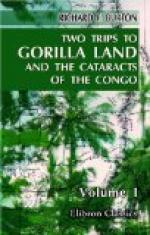The expedition began unfortunately, by the loss of outfit and instruments in the “Nigritia,” wrecked off Sierra Leone: it persevered, however, and presently met Dr. Bastian and Professor von Gorschen at Cabinda. The former had collected much information about the coast. He had learned from slaves that the old kingdoms of Loango, Mahango, and Angay are bounded eastwards, or inland, by Mayombe, a belt of forest, the threshold of the unknown interior. It begins the up-slope to the great Ghat ridge, which, visible after a day’s journey, separates the coast from the central basin. A fortnight or three weeks’ march leads to an open country, a land of metalliferous hills, where the people barter their goods against gunpowder and weapons, brought by traders from the east. These “Orientals” are now heard of almost all along the West African coast, and doubtless, in several places, the report will prove true. The prospector had also visited, in search of a depot, Futila in Cabinda-land; the Tschiluango (Chiloango), or Cacongo River, a fine navigable stream, where the people float down their palm oil; Landana; “Chinsonso” (Chinxoxo, pronounced Chinshosho), Chicambo, Loango, and the Quillu (Kwillu) stream, the latter breaking through the coast range, disemboguing near Loango Bay, and reported to be connected with the great Congo. He found the old despotism of Loango to be insignificant, reduced, in fact, to the strip of coast between the Quillu and the Luema-Lukallo Rivers. The slave trade, once a monopoly of kings, princes, and chiefs, is now no more; legitimate commerce has levelled ranks, and the real power is in the hands of the wealthiest merchants.
From the Abbe Durand, librarian of the Paris Geographical Society, we learn: 1. That Loango is in the Province of Cacongo; 2. That Cacongo is considered a province of Loango; 3. That Cacongo forms a kingdom of itself, with a capital, Ringwele. The name of the late king was “Dom Joao, Capitao Mempolo,” and, though he had died some years ago, he was not buried, for the usual reasons, in early 1874. Meanwhile his nephew and successor, Mwata Bona, was acting regent until the obsequies shall take place.
The station finally chosen by the German explorers was Chinxoxo, or, as Herr Kiepert uncompromisingly writes it, “Tschinschonkscho.” It is within easy distance of the Chiloango or “Luiza Loango” River; and its port, Landana in Cabindaland, has become a thoroughly Europeanized settlement, with five trading stations up stream. An empty Dutch factory was repaired, and the house, containing a parlour, three small bed rooms, and the usual offices, was ready for habitation by the second week in October.




